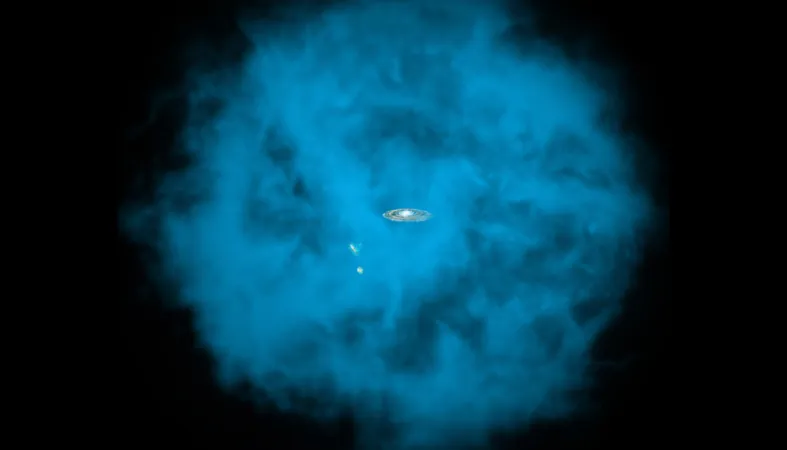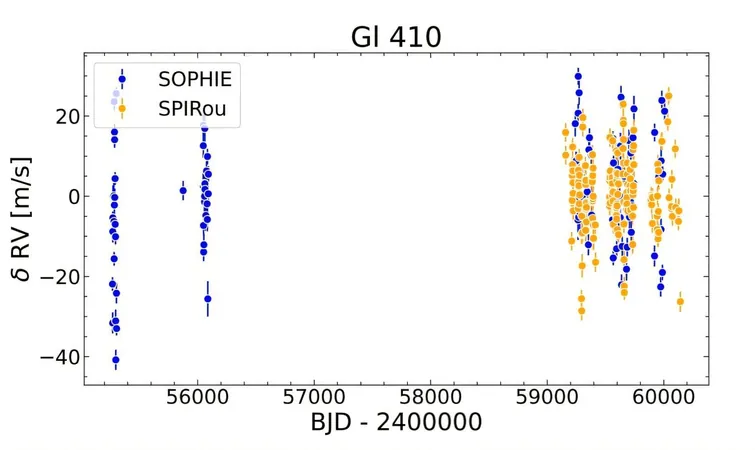
Astronomers Discover Half of the Universe's Missing Hydrogen Gas!
2025-04-14
Author: Charlotte
A Groundbreaking Cosmic Revelation!
In a stunning breakthrough that could change our understanding of the universe, astronomers have unveiled the whereabouts of more than 50% of the universe's missing hydrogen gas! For years, scientists have struggled to account for normal matter—everything from stars to galaxies—in the cosmos, but it turns out that vast amounts of this matter have been eluding detection.
The Invisible Halo of Ionized Hydrogen
Recent measurements have pinpointed this elusive hydrogen gas, found in the form of diffuse and invisible ionized hydrogen, that surrounds galaxies in a sprawling halo. This discovery not only reconciles discrepancies between astronomical observations and existing cosmic models but also suggests that black holes at the centers of galaxies are much more active than previously believed.
According to Boryana Hadzhiyska, a postdoctoral fellow at UC Berkeley, "As we expand our search, we’re confident we’ll uncover all the missing gas. But we plan to conduct thorough analyses to confirm these findings."
Massive Black Holes: More Active than Ever
The research indicates that massive black holes may hurl gas much farther from their centers than anticipated—up to five times the expected distance! Simone Ferraro, a senior scientist at Berkeley Lab, affirmed, "These measurements align with the notion that we’ve been underestimating the extent of this ionized hydrogen halo. This suggests new dynamics at play when it comes to black hole activity!"
The Science Behind the Discovery
In a project involving 75 scientists globally, researchers analyzed images of about 7 million galaxies located within 8 billion light-years of Earth. By measuring subtle changes in the cosmic microwave background—radiation that spans the universe—they could detect the presence of ionized gas that had previously gone unnoticed.
This technique utilized data from both the Dark Energy Spectroscopic Instrument and the Atacama Cosmology Telescope, which significantly contributed to the precise measurement of cosmic background radiation.
What This Means for Cosmic Evolution
This discovery holds immense implications for our understanding of cosmic evolution. It challenges existing theories about how gas behaves in tandem with dark matter, and suggests that gas expulsion from massive galaxies needs to be factored into current astronomical models.
"Identifying where this gas resides has been a major hurdle in cosmology," Ferraro stated. "Now that we have clarity on this issue, we can tackle a myriad of other cosmic questions!"
A New Era in Cosmology?
Astronomers are buzzing with excitement as the findings promise to spark a flurry of research and discussions on galaxy formation and evolution. With this newfound knowledge of the universe's hidden gas, the astronomical community is poised for a deeper dive into the cosmos than ever before.
Get ready—we're just beginning to scratch the surface of the universe's secrets!









 Brasil (PT)
Brasil (PT)
 Canada (EN)
Canada (EN)
 Chile (ES)
Chile (ES)
 Česko (CS)
Česko (CS)
 대한민국 (KO)
대한민국 (KO)
 España (ES)
España (ES)
 France (FR)
France (FR)
 Hong Kong (EN)
Hong Kong (EN)
 Italia (IT)
Italia (IT)
 日本 (JA)
日本 (JA)
 Magyarország (HU)
Magyarország (HU)
 Norge (NO)
Norge (NO)
 Polska (PL)
Polska (PL)
 Schweiz (DE)
Schweiz (DE)
 Singapore (EN)
Singapore (EN)
 Sverige (SV)
Sverige (SV)
 Suomi (FI)
Suomi (FI)
 Türkiye (TR)
Türkiye (TR)
 الإمارات العربية المتحدة (AR)
الإمارات العربية المتحدة (AR)